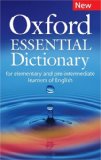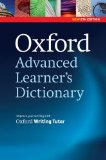Oxford English Dictionaries
Oxford English dictionaries are widely known and extensively used. They also greatly vary in depth and size.
Click Here for Step-by-Step Rules, Stories and Exercises to Practice All English Tenses
Here I will review two of the most useful English-English Oxford dictionaries for English learners:
- Oxford
Essential Dictionary
(jump to the review)
- Oxford
Advanced Learner's Dictionary
(jump to the review)
Oxford English Dictionaries Part 1:
Oxford
Essential Dictionary
English Level: Elementary and Pre-Intermediate

It is a very simple dictionary for beginners. What's great about it is that it uses simple and basic words inside its definitions.
The problem with simple dictionaries is that sometimes they get too simple, meaning, they can mislead and over-simplify words, and leave you in confusion.
Oxford Essential Dictionary, however, has a great balance:
it is very easy to understand, and it does not leave out critical data.
In other words, it can be ideal for learners of English and/or school children.
Just for comparison... here is a typical example to illustrate what I mean. Let's have a look at the word "abolish".
Here is a definition from Merriam Webster's On-Line Dictionary:
Abolish = "to end the observance or effect of: annul."
(Note: Observance = to behave according to a particular law or custom.
Annul = to cancel something legally.)
Here is the definition from Oxford Essential Dictionary:
Abolish = "to stop or end something by law."
So unless your level of English is VERY good, Merriam Webster's On-Line Dictionary may be too difficult. You must be able to look up a word and understand the definitions.
So what does Oxford Essential Dictionary include?
- 19,000
words and phrases explained
in clear, simple English.
- The 2,000
most important and useful words to learn at this level are
clearly marked as keywords so that learners give them special attention.
- 13,000
example sentences throughout the dictionary to
help learners use the words correctly.
- 500 notes on spelling, grammar and pronunciation to
help learners avoid mistakes and build their vocabulary.
- Over 400 illustrations
throughout the dictionary and a colorful 16-page Picture Dictionary
section help to explain difficult words or to show a word's different
meanings.
- 16-page study section gives extra help on topics such
as talking on the telephone, letter writing, and talking about dates
and numbers.
- You can also get it with a CD-ROM. This lets
you search the dictionary and hear spoken British and American pronunciation of all
the words and listen to spoken
examples.
- The CD-ROM also contains games and exercises to give more practice in vocabulary learning and help prepare for standard exams.
Any downsides?
Oxford's Essential Dictionary is exactly as the name suggests:
essential. Meaning, it has the most essential and important words of
English, but not all of them. As your level of English advances you
will need to supplement it with a bigger dictionary, which would have
more words, and more data about each word.
Conclusions
With that said, this simple dictionary is quite priceless for
beginners. it is a truly helpful guide for
students in the first stages of learning English, simply
because it helps you learn the most
important words and how
to use them.Get your copy of Oxford Essential Dictionary by Oxford University Press.
Oxford English Dictionaries Part 2:
Oxford Advanced Learner's Dictionary
English Level: Upper-Intermediate to Advanced

It is just so simple and to the point! A true English learner's paradise...
Now, what's the difference between it and his "little brother" the Oxford Essential Dictionary?
- It has much much more words defined.
The Oxford Essential Dictionary only has the most basic and common
words of English.
- It is more thorough and gives much more defintions.
- It gives much more idioms.
- It gives a list of phrasel verbs under
verbs.
- It shows the natural usage of the words by making the typical expressions bold.
Let's actually compare them, using the word "admire."
From the Oxford Essential Dictionary:
Admire = to think or say that somebody or something is very good.
- I really admire you for doing such a difficult job.
- They were admiring the view from the top of the tower.
From the Oxford Advanced Learner's Dictionary:
Admire =
1. to respect somebody for what they are or for what they have done.
- admire somebody/something: I really admire your enthusiasm.
- You have to admire the way he handled the situation.
- admire somebody/something for something: The school is widely admired for its excellent teaching.
- admire somebody for doing something: I don't agree with her, but I admire her for sticking to her principles.
2. admire something: to look at something and think that it is attractive and/or impressive.
- He stood back to admire his handiwork.
- I've just been admiring your new car.
- Let's just sit and admire the view.
So as you can see, the Oxford Essential Dictionary is much more simple, but the Oxford Advanced Learner's Dictionary is much more thorough and precise, without really being much harder to understand.
Which one should you use? That is up to you. Judge your level of English and decide accordingly.
Here are some more example definitions from the Oxford Advanced Learner's Dictionary
Abolish = abolish something: to officially end a law, a system or an institution.
- This tax should be abolished.
Electricity = a form of energy from charged elementary particles, usually supplied as electric current through cables, wires, etc. for lighting, heating, driving machines, etc.
- a waste of electricity
- The electricity is off (= there is no electric power supply)
Utesil = a tool that is used in the house.
- cooking/kitchen utensils
Now, this wonderful dictionary is available online for free.
However, if you buy the book and CD-ROM versions you get some extra cool features:
- Oxford Writing
Tutor and Oxford iWriter
- Integrated thesaurus
and word origins
- Thousands of extra example sentences
- Visual
vocabulary builder
- Topic collocations
(combinations of words
that are used together frequently) and topic vocabulary
- Different exercises with different accents
Get Updates, Special Offers, and English Resources
Download your FREE GIFT (the first two chapters of
English Short Stories Book and Workbook)
as soon as you join!

By submitting your email, you consent to receiving updates and newsletters from us and to the sharing of your personal data with third parties for the purposes of sending you communications. We will not spam you. You can unsubscribe at any time. For more information, please see our privacy policy.





